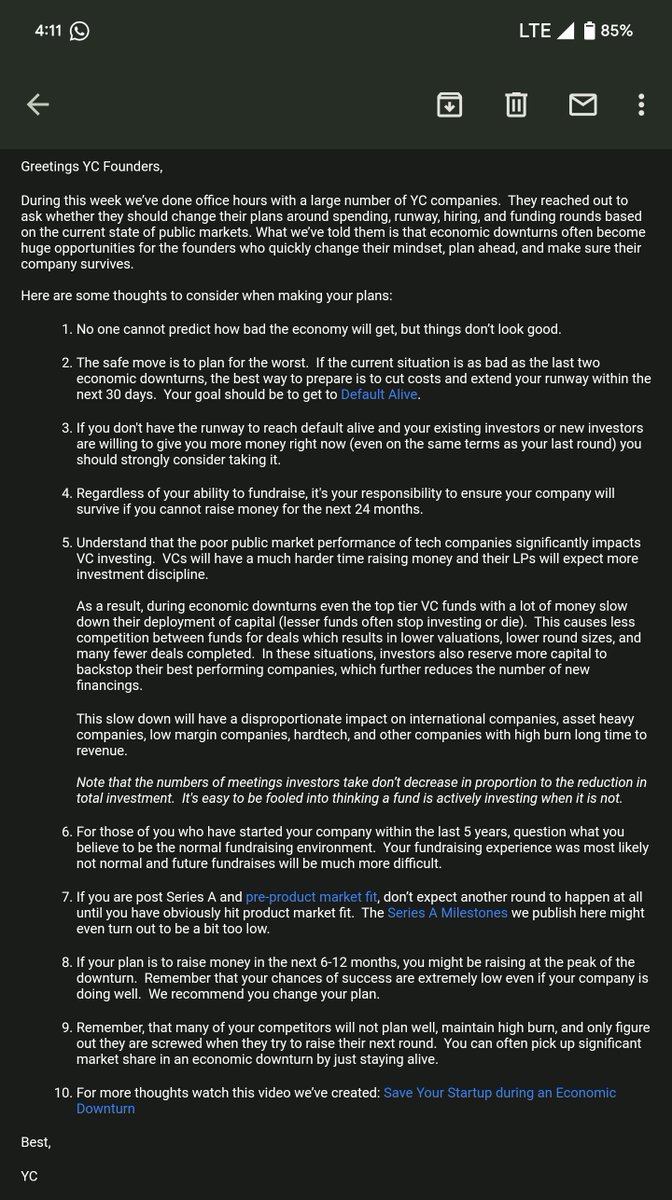Y Combinator (YC), one of the most successful startup accelerators, has in a letter to startup founders under its guidance and advised them to come up with new strategies to scale through the current economic downturn and challenges and raise funding or stay ‘Default Alive’.
Y Combinator which has launched more than 3,000 companies, including Stripe, Airbnb, Cruise, PagerDuty, DoorDash, Coinbase, Instacart, Dropbox, Twitch, and Reddit, advised the companies to cut their expenses and focus on extending their runways within the next 30 days.
Read also: With new $1bn innovation hub, Rwanda is becoming Africa’s leading tech destination
In this article, we will briefly look at five points from YC’s letter to startup founder that would interest every tech entrepreneur and what that should make you do:


1. Things are not looking good
Having just come out of the pandemic- covid-19, many economies are just beginning to gather their losses and take concrete steps to improve their growth trajectory and initiate policies that would resuscitate their economy back to a path of financial strength and survival.
Experts believe that Africa has been hit worse even by the events of the pandemic. According to the World Health Organization (WHO), Africa’s battle against COVID-19 proved to be an extremely difficult one. This has been heightened by the severe third and fourth waves of the pandemic and vivid COVID-19 vaccine inequity.
For African Region countries, these challenges were compounded by a range of other humanitarian crises. 38 of the 47 African countries are experiencing some level of food shortage. The reasons vary from extreme weather events to political crises or conflicts.
Another significant factor which has been a major concern for a while now is the Russia-Ukraine war, which has resulted in the loss of lives, property, economic sanctions and restriction of trade, resulting in investors’ pessimism as the Dollar continues to suffer.
This is the reality and every entrepreneur must prepare for the eventuality of the now!


2. Cut costs and stay alive
The idea for Default Alive explains a startup based on current expenses, growth rate, and cash on hand – if the business is on the right trajectory to reach profitability before running out of money, according to Paul Graham, founder of Y Combinator.
If the answer to the above is yes, a business is said to be in default alive, otherwise, it is default dead.
YC is advising founders to cut excess operational costs or every needless cost for that matter. This is because that will draw significantly on your revenue. The big question is: can you business last for the next 24 months based on your revenue and expenses alone, even if you are unable to raise funding from investors or not.


3. LPs will expect more investment discipline
The letter by YC also advises that VCs, in the period of downturn, are likely to be careful on how they deploy their funds because of poor public market performance.
Investors will be driven to hold back their funds to finance more performing companies, which may result in poor funding for most startups trying to find their feet in the market.
Note that the numbers of meetings investors take don’t decrease in proportion to the reduction in total investment.
This will further result in stiffer competition for available funds.
4. Change your strategies
YC’s team called for a change in strategy in raising funds for companies who have become used to their “normal way” of raising funds, which is at the backdrop of changing climes(economic downturn peak).
Raising funds would clearly be difficult in the future. Chances of success is slow
Y Combinator’s team
5. Try to Stay Alive
Most companies scale after downturns, but that is if they stay alive and get a share of the market afterwards. This is because industry competitors would not always be smart to figure out they are already doing badly.
Hence, founders should make survival in periods of downturn their priority.
The team highlighted that a situation like this might offer opportunities for change in mindset on how they have normally run their companies.
This advice comes after a series of meetings with startup founders seeking to know the way forward around crippling economic conditions that affect their plans for spending, run rate, hiring, and funding rounds.
Have you seen any other ideas that you think should have made the list? Share in the comment box. Read the letter bellow







